Broadway star talks redwoods, growing roots, and repairing the world
In the new musical Redwood, Zachary Noah Piser takes to the stage alongside two icons: Broadway legend Idina Menzel and a massive coast redwood, magnificently recreated inside the Nederlander Theatre. The fact that Piser holds the audience’s rapt attention is a testament to his stirring voice and the emotional truth of his performance. Other cast members may literally soar through the canopy, but Piser lifts up the story with his authenticity and heart.
Piser is no stranger to Broadway, having charmed audiences in Dear Evan Hansen, Wicked, and KPOP. Yet Redwood offers the Bay Area–raised star a unique chance to channel his California roots, Jewish heritage, and love for nature. Between performances—and creating his behind-the-scenes Redwood vlog, Family Tree—he found time to talk with Save the Redwoods League about Broadway, big trees, and personal transformation.
What initially drew you to this project?
I was sent a demo of one of the songs that I happen to sing in the show. I remember listening and being blown away. It was sung by Kate Diaz, our composer and also lyricist, who has one of the most spectacular voices. I really fell in love with how emotional and visceral her composition was. And then of course, also learning that Tina Landau was the director, and that Idina Menzel was signed on to be the star… the rest was history. I remember just saying, “Okay, I’ve got to be a part of it.”
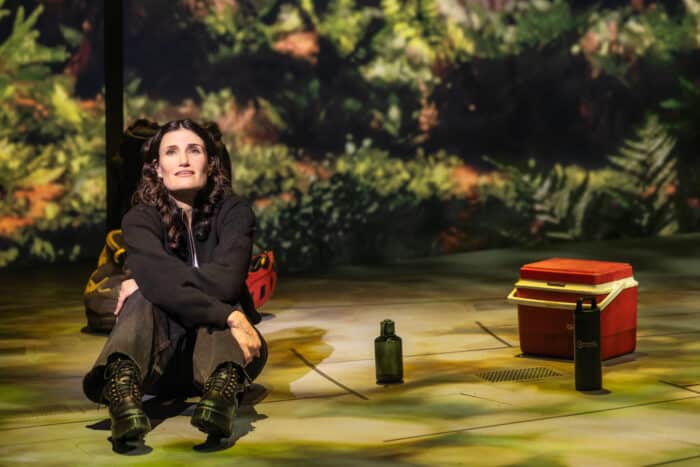
What is it like to work with Idina Menzel?
Oh, man, there’s so many things to love about her. I mean, she is an icon. She has had culturally definitive work in every decade of her life. Rent in her twenties, Wicked in her thirties, Frozen in her forties, and hopefully now Redwood in her fifties. She is a culturally defining artist.
The other thing that’s more important to me, honestly, is she’s just a good human and a great collaborator. She cares, to a fault, so deeply about the work. And that’s not always what happens when you work with people of such caliber. I mean, she goes on this insane, Herculean journey every single night with the show. And when she takes that bow and leaves the stage … she’s just brimming because she’s so happy to be telling the story and to be back on Broadway and to be sharing that with us and audiences.
Tell me about originating your character in Redwood.
The character I play is Spencer—the son of Idina’s character, Jesse, and a woman named Mel, played by the incredible De’Adre Aziza. And the amazing thing about being a part of the process from so early on is that I’ve really been able to put parts of my DNA into this character. I’m talking my specific heritage of where my mom’s from, where my dad’s from, my personality traits. This really has been a dream come true in so many ways, being integral to the creation of this person.
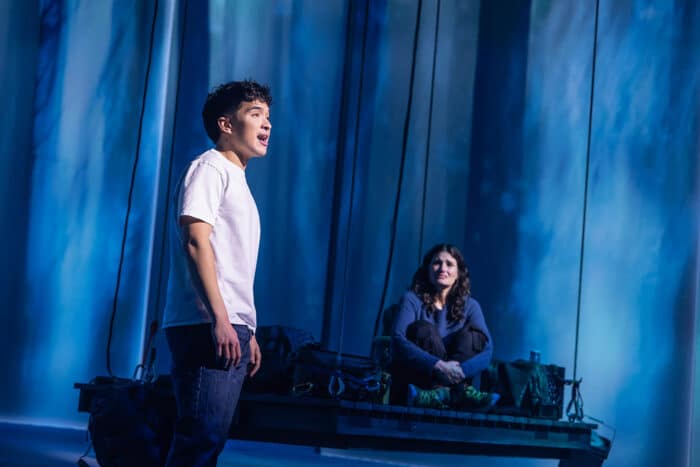
How did the team create a redwood forest inside the theater?
Our designers …really did just spectacular work. Not just making the audience see an actual redwood tree on the stage, but evoking in totality the sense of when you walk into the redwood forest, which I’m familiar with—I know, I remember, that sense of awe and a little bit of fear and obviously so much wonder. Between the projections and the bareness of the stage and our main set piece really being this incredible tree, they nailed it right on the head in terms of evoking that sense of, “Oh my gosh, I am in a redwood forest.
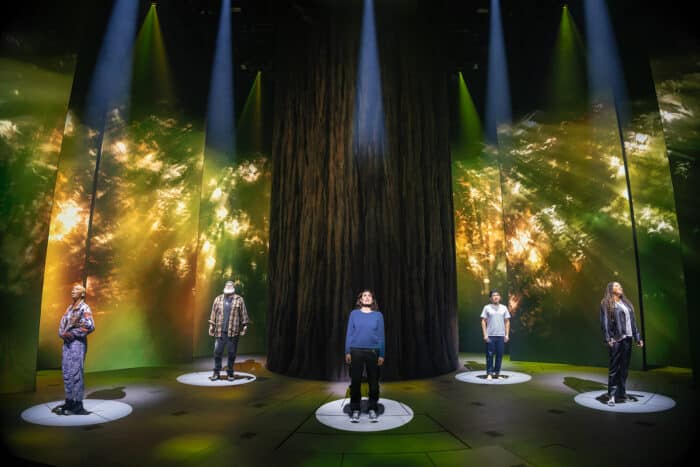
What was your first experience with redwoods?
So, I grew up in Piedmont, California, in the Bay Area. And I remember field tripping to the redwoods because it was so important to learn about the nature that surrounded us. That was really important to my public school. We went to the ocean and we did all the tide pools on one day, and then the other day we went to see the redwoods. It was incredibly educational.
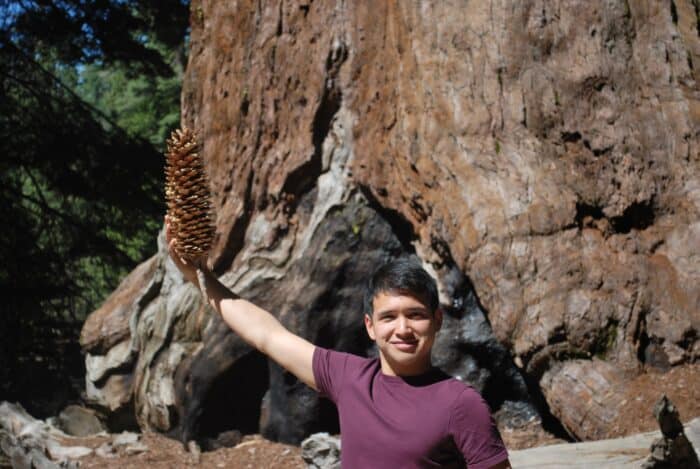
In college you studied theater, but also biology?
I did. I always like to say that I was a late bloomer to theater. I had it pretty dead set from middle school through high school that I wanted to be a veterinarian. I applied [to Northwestern] as both a biology major specifically and a theater minor or theater double major, and ended up completing both of those course loads.
Does any cool forest science show up in the production?
Absolutely. I’ve learned so much about heartwood [the dead yet supportive wood at a center of a tree]. I’ve learned so much about fires and prescribed fires. One of the many things I love about the show is that you come away learning so much about redwoods and their ecosystem, but it doesn’t feel like you’re watching National Geographic. It’s not like, “Okay everyone, take out your pencils and write down what you’ve learned.” You learn through the songs, through the scenes, through these characters that you come to love.
But two of the five characters are canopy botanists. So they are fully describing carbon sequestration to an audience…I mean, I didn’t know what those words meant at all! And I studied science at school. So yes, if anyone has a crossover of interest in science and in theater, as I do, this is definitely the show for them.
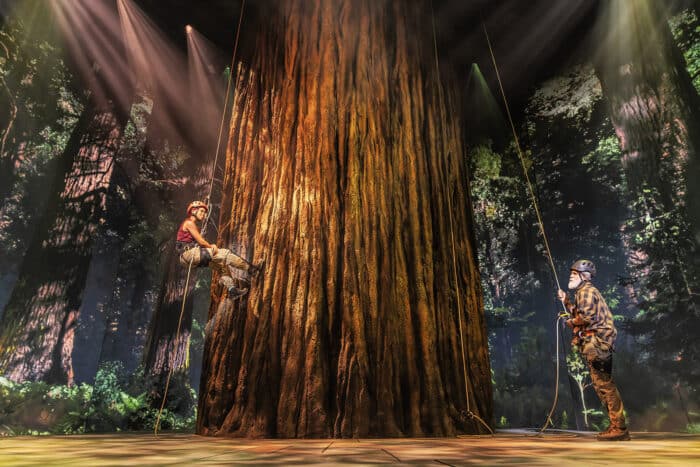
Did you return to the redwoods before the production?
I have not gotten a chance to go back to the redwoods. But the creative team wanted to make sure the people who were brand-new to the Broadway production—a lot of our understudies and especially the people who had never climbed before—had at least an understanding of the majesty of redwoods. I have many friends who were those understudies and I got to kind of live vicariously through them seeing a redwood for the first time. It’s that weird dichotomy: You feel so, so small, but at the same time you feel so powerful just being next to something that has lived so many lifetimes of yours.
How does Redwood capture the importance of protecting nature?
Well, there are a lot of beautiful Jewish themes in the show. I’m Jewish and Idina is Jewish, Tina’s Jewish. And a huge tenet of Jewish belief is something called tikkun olam, which essentially means “repairing the world.” And one of the characters in the show, that character’s kind of life mission is to be a vessel for that … The audience learns the importance of nature, of being good to nature, of taking care, of repairing it as you can.
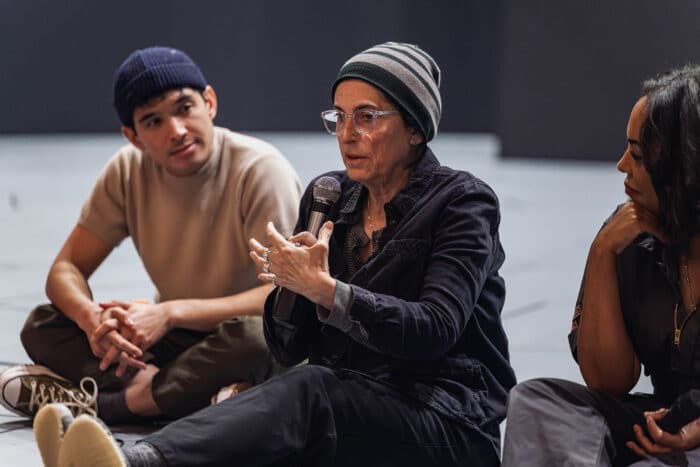
Does that feel especially relevant right now?
It definitely feels relevant. Our story, at the end of the day, is one of resilience, of hope, of transformation. I think that I definitely need that. I mean, doing the show every night is such a gift, but also listening to the show is equally valuable for anyone who is existing on our Earth, in our galaxy currently.
And it’s so exciting to be able to be a part of a show that has such a strong mission. Just the other night we had one of our social impact shows, where we invited charities and organizations we’ve partnered with, like Save the Redwoods League. All of these incredible organizations that specialize in environmental change and climate and tikkum olam and mental health that are effecting real change in the world that needs so much of that right now.
What excites you about the work of Save the Redwoods League?
The idea that you find and restore forests that are in danger or are hurting, I mean, that feels like all of you are angels … The fact that you’re willing to do that work, which I’m sure is so difficult, I can’t even imagine. So difficult, so heartbreaking to see how these forests have been treated in the past, but to put in the time and care and effort and blood, sweat, and tears to rebuild and to repair is some of the most meaningful work that I’ve ever read about.
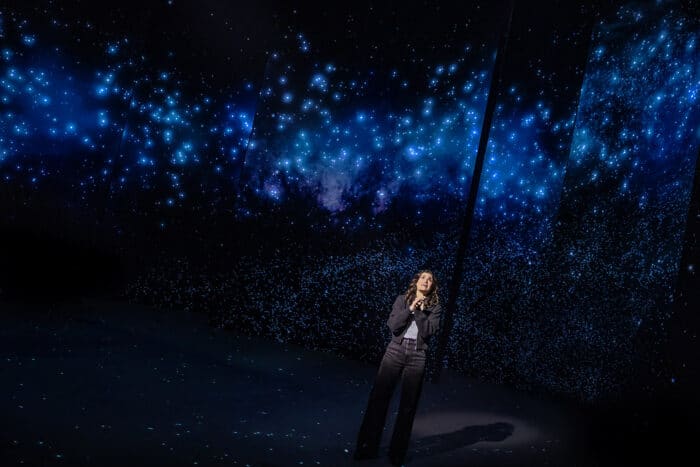
What it is about redwoods that inspires transformation and hope?
The most fascinating thing to me about redwoods is the sense of rebirth and regrowth. And that idea of heartwood is the central tenet of the show. This is maybe a spoiler, but the character that I play is an emanation or a manifestation of Jesse’s heartwood. That’s kind of like the ultimate takeaway for that character. And to me, this idea, that something that is technically dead makes something stronger—I’m going to get emotional just talking about that—that is one of the most beautiful, insane, “I don’t understand how nature works” things I’ve ever heard.
How does the concept of “roots” play into the story?
I would say that is one of the other central tenets throughout the show. [Idina’s] character says something like, “Oh, well, I’m sure the roots are really deep. They must be so deep to hold up these gigantic things.” And my character says, “That’s wrong. The roots are shallow. They only go five or six feet into the ground.” And then we have this beautiful scenic design and projection design as one of the characters is describing the root system of a redwood grove. You see it kind of happen, this idea that the roots are shallow, but the thing that holds them up is their connection to each other.
This story is about someone who is trying to escape something, but ultimately realizes that the only way through is to connect with others and to strengthen that connection with your family, with your friends, with new people. And that is something incredibly valuable to one’s own healing, whatever you’re going through.
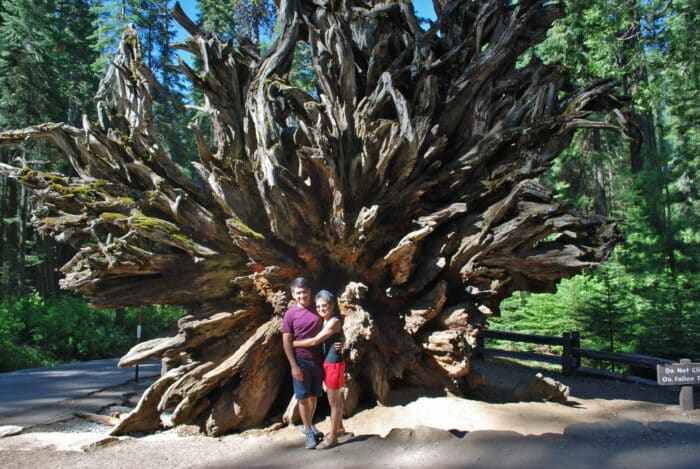
What message do you hope people take away from Redwood?
I think a lot of the messages—roots, tikkun olam, repairing the world, being an agent for change—I hope people walk away with. The more immediate feeling…I hope it has the effect of letting everyone take a collective breath. It’s like when you first go into nature, the first thing that anyone ever tells you to do is “Take a breath, breathe in the air.” It’s like the freshest air you can have. And I think because our designers have evoked that in the space, and the story is so cathartic and emotional and funny and all these things, I hope everyone leaves feeling that sensation of “I took a breath.” I hope it gives that little bit of reprieve.
How about you personally?
I’m Asian and Jewish, so I’ve got an intense amount of neuroses and anxiety. And this show has come at such a beautiful time in my life, with what’s going on in the world and with me personally, of just reminding myself to, one, take a breath and also take comfort in the roots that I’ve already built, and that I will continue to build in my professional and personal life, and to bolster those.
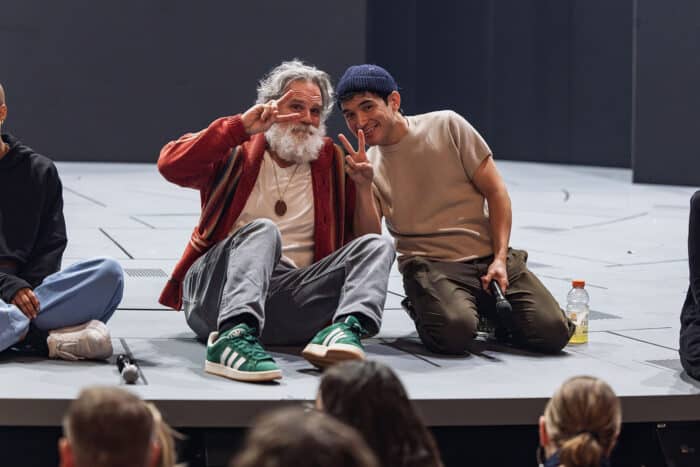
Could you share a favorite line from Redwood?
I get to say a lot of beautiful things, but one of the songs that I sing in the show, the theme is “while you’re still alive—live.” Which seems so simple or somehow trivial, like a note that you passed in high school or something. But when you think about that and when I say that in the show every single night… It is actually just the deepest, most basic need and want as a human: While you are still alive—because some people are not, some things are not—live. Take advantage of that and embrace it for all of the ups and the downs and the fears. I think that that is one of the most meaningful sentiments that I’ve been able to share on a Broadway stage.
Get your tickets to Redwood, now playing at the Netherlander Theatre in New York City.

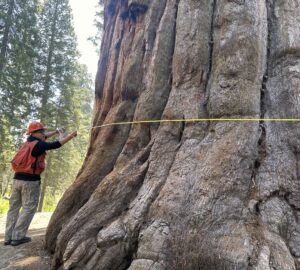



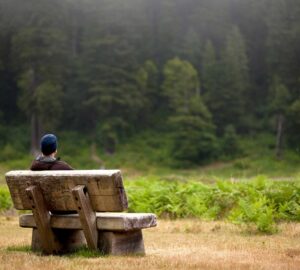
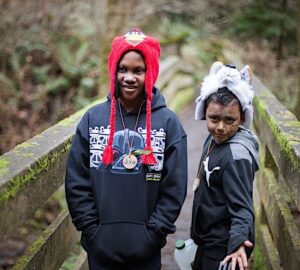
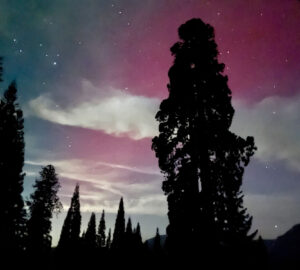
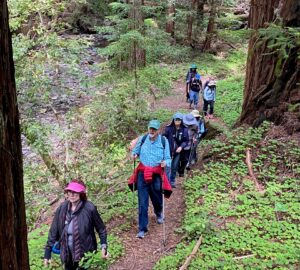
One Response to “Q&A: Zachary Noah Piser of Redwood the musical ”
Bonita
Brilliant/beautiful interview…🙌🏼💜💚
Many thanks 🫂🤍